Latest news
14 results
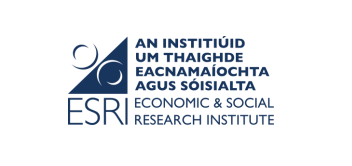
Gambling offers – such as free bets and moneyback guarantees – entice people to bet more, with those at risk of problem gambling especially susceptible, according to new research from the ESRI’s Behavioural Research Unit.A new study commissioned by the Gambling Regulatory Authority of Ireland (GRAI) /Department of Justice, Home Affairs and Migration and undertaken by the Economic and Social Research Institute (ESRI) shows that betting and gambling companies offering special offers or inducements encourages people to gamble more than they would otherwise, even when the odds offered are “bad”.Special offers or inducements, such as free bets and moneyback guarantees are regularly used by gambling companies in their marketing campaigns. The study found that vulnerable people such as those at higher risk of becoming problem gamblers, were most at risk of gambling more, and losing more, as a result of being offered inducements.In a controlled experiment run with a sample of 622 men under 40, participants, were given money to place up to six realistic bets on the Euro 2024 football tournament.Half of the participants were randomly selected and shown offers of free bets and moneyback guarantees on some bets. which caused these participants to spend over 10% more than those who were not given inducements. The inducements also reduced the number of participants opting not to bet by nearly half. Even inducement bets that were designed as "bad”, showing odds far below market rates, were undertaken by participants in this group, who were three times more likely to spend money on “bad” bets.These findings illustrate the harm inducements cause, particularly to those who are susceptible to gambling harm.Under the Gambling Regulation Act 2024, the legislation which underpins the work of the GRAI, inducements or encouragement to gamble further will soon be an offence and licensed operators will no longer be allowed to offer free bets which are targeted at individuals and specific groups. Multiple European countries have also begun to regulate inducements.Participants were surveyed after the study on their knowledge and understanding of inducements. Even amongst regular betters, most did not know that there were restrictions on free bets and that they would not receive their stake back if they won a free bet.Paul Quinn, Chairperson of the GRAI, said:“I very much welcome this research from the ESRI examining the impact of inducements to gamble on gambling behaviours. Having a clear evidence base is critically important to the GRAI as we commence our work in regulating the gambling industry. This latest research will help inform that work and in educating the public on this matter. This study clearly indicates the damaging effect of certain practices around inducements. It underlines the importance of the provisions of the Gambling Regulation Act in limiting a person’s exposure to inducements to gamble. We look forward to working with Minister O'Callaghan in addressing the issue as we implement the new regulations.” Anne Marie Caulfield, CEO of the GRAI, said:“The ESRI’s findings confirm that not only is the general public not aware of the dangers associated with inducements to bet, but also that the impact of these inducements go beyond simple marketing by betting companies. It is our responsibility to ensure that gambling operators do not encourage excessive or compulsive gambling behaviour, and that we protect vulnerable people in our society, such as children and young people and those more likely to experience gambling harm.The Gambling Regulation Act 2024 sets out obligations for licensees in the way in which inducements can be offered, including a ban on targeted inducements, and the findings of this study affirm these measures.”Diarmaid Ó Ceallaigh, Postdoctoral Research Fellow, Behavioural Research Unit, ESRI, said: "Our findings imply that gambling offers aren’t merely marketing tools, but pose a real risk of financial harm, particularly among vulnerable groups. The results support the case for stricter regulation of gambling offers in Ireland, following steps already taken in other European countries, such as banning sign-up bonuses, restricting offers to at-risk individuals, and capping their value."The full paper can be found here
25 Jun 25
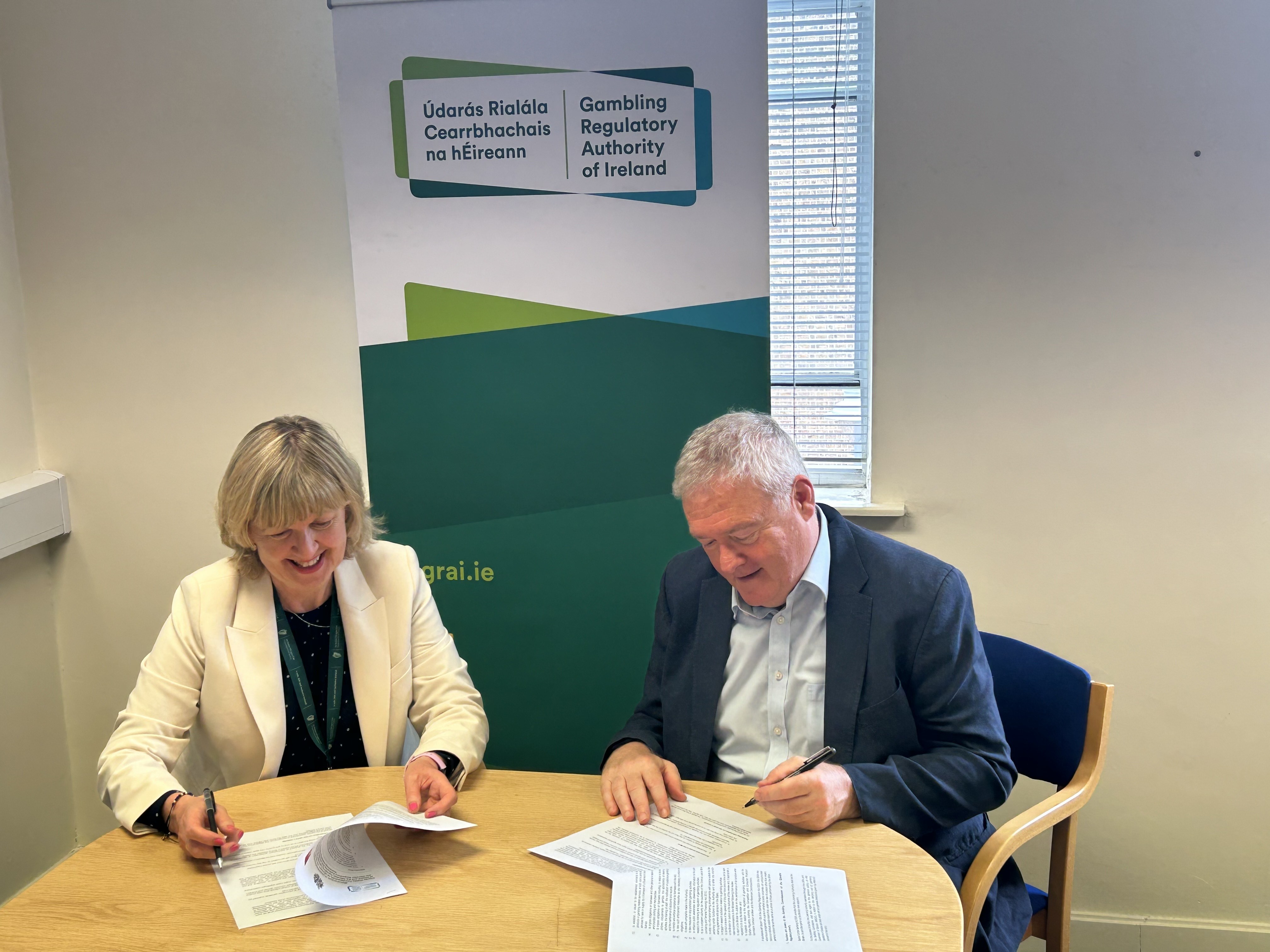
Dublin-June 25th. As part of the process to put in place information sharing agreements with other regulatory bodies, CEO of the Gambling Regulatory Authority of Ireland, Anne Marie Caulfield signed a Memorandum of Understanding with Commissioner Andrew Lynam representing the Gibraltarian Gambling Regulator. This agreement establishes a framework for cooperation and sets out the broad principles of collaboration between the Gambling Regulator and the Gibraltarian authorities. The shared aims of both regulators are to enable closer working relationships which will enhance each organisation's ability to discharge their respective duties and functions.The Gibraltarians have given their time generously in the set up phase of the GRAI and their support and advice has been greatly received.This is the third of a series of MOUs which the GRAI intends to put in place with other Gambling Regulators in other jurisdictions over the coming months as we move towards opening for our first phase of licensing On welcoming the agreement, CEO of the Gambling Regulatory Authority of Ireland, Anne Marie Caulfield said:'This Memorandum of Understanding signed with the Gibraltarian Gambling Commissioner Andrew Lynam, representing the Gibraltar Regulatory Authority is a significant step in formalising the working relationship between regulators in Ireland and Gibraltar. Given how many Gambling Operators are active in both jurisdictions this Memorandum of Understanding will be the first step in cementing what will be a positive and mutually beneficial working relationship between both organisations. This is another important step in the Gambling Regulatory Authority of Ireland series of MOUs with fellow regulators.We would also like to take the opportunity to welcome Andrew Lynam, CEO of the Gibraltar Regulatory Authority to Dublin and to thank him, and his team, for their ongoing support and assistance to GRAI. '
25 Jun 25
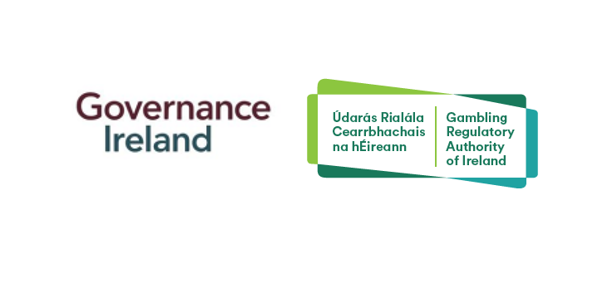
Response to Consultation Process and Update on Progression with TRIS Notification from the Gambling Regulatory Authority of Ireland (GRAI)GRAI response: The Gambling Regulatory Authority of Ireland (GRAI) wishes to express its sincere thanks to all stakeholders who contributed to the recent public consultation process, concerning the proposed implementation of provisions of the Gambling Regulation Act 2024 (Number 35 of 2024) (the “Act”) through two sets of regulations. The consultation was specifically in relation to Section 38 (Application Fees), Section 108 (Licence Durations), and Section 129 (Additional Licence Conditions) of the Act. The open consultation was held over a four-week period between April and May 2025, in keeping with the GRAI’s evidence-led, inclusive approach to our regulatory obligations. This engagement reflects our commitment to fostering a well-regulated, transparent, and socially responsible gambling environment in Ireland.The GRAI commissioned Governance Ireland, an external and independent governance consultancy firm, to undertake the collation, thematic analysis, and review of the submissions received during consultation, Governance Ireland’s ‘Public Consultation Response Report’, presents a comprehensive review of the twenty-seven (27) formal submissions received. The submissions received were from a cross-section of stakeholder categories, including industry operators, representative bodies, consultants, public bodies, and civil society organisations. All submissions were weighted equally, and the submissions were factored into the key thematic areas defined by the consultation and referenced in the Report.Following careful consideration of the submissions received and Report from Governance Ireland, the GRAI notes that while constructive feedback was provided across the proposed provisions (application fees, licence durations, and additional licence conditions) the majority of submissions, particularly from industry operators, expressed either supportive or pragmatic views on the proposals, including constructive suggestions for enhancement, rather than fundamental objections. Where concerns were raised (notably around the application fee structure and licence duration), these often stemmed from misunderstandings or divergent interpretations of terms within the Act, such as “turnover”. The GRAI commits to address the misunderstanding of terms/definitions through guidance documents in the future. The GRAI will also ensure that the Regulations clarify the position in relation to premises fees, as these apply to all premises applying for a betting or gaming licence.A number of observations received highlighted that without having full oversight of the fee governance framework, such as renewal fees and charges, it was difficult to provide a comprehensive analysis of the application fee provision. The GRAI acknowledges this and will ensure that the relevant fee structures will be communicated in a timely and constructive manner. It should be highlighted that licence type remote gaming is not currently licensed within Ireland and therefore, direct comparisons of overall application fee costs may not be consistent. It is also noted that these fees are for a new, self-financing regulatory regime with enhanced oversight and longer licence terms than the existing excise licensing regime in Ireland.A number of observations on application fees and licence durations took a comparative approach to reviewing the fees against the fees of other jurisdictions and the UK in particular. The GRAI reviewed the observations and found that the fees are not directly comparable with the UK given the differences in Regulatory structure and responsibilities. Many of the regulatory obligations that will be part of the GRAI’s responsibilities are not part of the Gambling Commission’s remit in Great Britain and instead are part of the functions of the local councils. Market size variations, differences in taxation policies and sectors that are regulated by Regulators in other jurisdictions also mean that the cross-jurisdiction comparisons are not comparing like- for- like.The GRAI must balance the complexity of licensing arrangements and the ability to ensure that costs are recovered proportionately from licensees. Where a relevant gambling activity requires a licence, it is also important to ensure that the fees payable for that licence reflect the related regulatory costs that must be recovered from such licence holders, taking into account the size and complexity of an operator’s business in terms of the risks to the licensing objectives.With regards to licence duration, the Act specifies a minimum time frame of one year. The GRAI is proposing that licences will be of three years duration. Whilst the GRAI notes that the proposed three-year licence term was supported by three respondents, the GRAI acknowledges the theme of the responses in relation to the consideration of an extension of the licence term. As such, the GRAI will commit to keeping the licence term under review as the licensing regulatory framework is established but are satisfied that three-years duration is an appropriate starting point.The GRAI reaffirms that the development of its licensing framework is grounded in robust evidence, public interest considerations, and the statutory obligations placed on the GRAI in the Act. Accordingly, the GRAI intends to proceed with the formal notification of the regulations to the European Commission, Member States, and the public under the Technical Regulation Information System (TRIS), in line with Directive (EU) 2015/1535. The TRIS notification is a standard procedural requirement for technical regulations, ensuring regulatory coherence across the European Union.The GRAI will continue to engage with stakeholders as we implement the licensing framework and where necessary, provide further guidance. Constructive dialogue remains central to our approach, and we welcome ongoing collaboration with all relevant parties, including industry participants, public health bodies, members of the public, civil society groups, and regulatory peers.The GRAI remains committed to transparent, proportionate and effective regulation of Ireland’s gambling industry.Full Report Available here: Full Report *Please note that the Observations outlined in Section 7 of the Full Report are based wholly on the substance and weight of views extrapolated from the submissions received under the consultation process
05 Jun 25
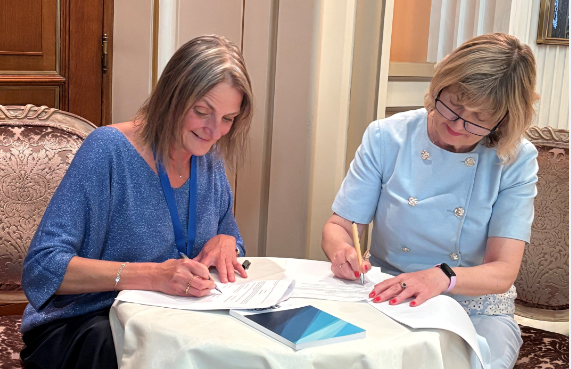
As part of the process to put in place information sharing agreements with other regulatory bodies, CEO of the Gambling Regulatory Authority of Ireland, Anne Marie Caulfield signed a Memorandum of Understanding with Magali Clavie of the Belgian Gaming Commission. This agreement establishes a framework for cooperation and sets out the broad principles of collaboration between the Gambling Regulator and the Belgian Gaming Commission. The shared aims of both regulators are to enable closer working relationships which will enhance each organisation's ability to discharge their respective duties and functions.The Belgian Commission have given their time generously in the set up phase of the GRAI and their support and advice has been greatly received. This is the second of a series of MOUs which the GRAI intends to put in place with other Gambling Regulators across the EU in the months ahead.On welcoming the agreement, CEO of the Gambling Regulatory Authority of Ireland, Anne Marie Caulfield said:'This Memorandum of Understanding with the Belgian Gaming Commission is a significant step in formalising the working relationship between Irish and Belgian gambling regulators. I would like to thank Magali Clavie, Steve Mees, and their colleagues for the support and advice they have given the Gambling Regulatory Authority of Ireland in its formative phase.'
27 May 25
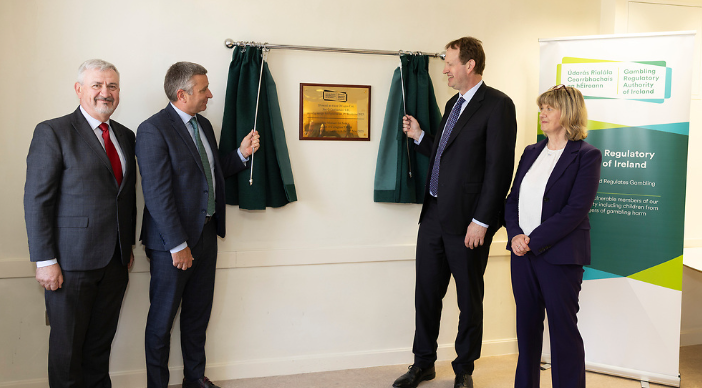
The Gambling Regulator was delighted to host Minister for Justice Jim O'Callaghan and Minister for State Niall Collins who formally opened our new Mount Street office.Both Ministers were joined by Department of Justice officials and Minister O'Callaghan spoke of the importance of the mandate given to the GRAI and the role of the Authority is delivering an effective regulator for the gambling sector with an emphasise on education and awareness, protecting those from gambling harm and delivering certainty for the industry.Minister O'Callaghan and Minister Collins unveiled a dedicated plaque marking the occasion and Chairperson Paul Quinn and CEO Anne Marie Caulfield also spoke and thanked the Minister and previous Ministers for their commitment in passing the Gambling Regulation Act and Establishing the Gambling Regulatory Authority of Ireland.As part of the visit Minister O'Callaghan's visit, he joined the Authority for a meeting and met with staff working across the various functions again offering his support.Speaking at the event Chairperson, Mr Paul Quinn said:'On behalf of my colleagues, I would like to acknowledge the excellent groundwork that has been already laid by Anne Marie and her colleagues in both the Authority and in the Department of Justice over the last couple of years. This hard work set us well on the road to success, albeit we know there will be the inevitable twists and turns in progressively introducing regulation.The Authority will bring robust and much-needed regulation to gambling in Ireland, giving certainty to Industry and building trust in the many consumers who enjoy sociable gambling, while also importantly protecting the most vulnerable in our society.It is essential that we build that public and industry trust by getting the three legs of the regulatory stool, licencing compliance and enforcement, to mutually reinforce each other in creating a robust frameworkThe societal impacts of problem gambling are very much at the core of the legislation and establishing this Authority. I am hopeful that our work will reduce the stigma and secrecy associated with problem gambling by building greater awareness of its extent as a public health issue, by conducting research to inform decisions of the Authority and Government Policy, and in providing greater supports to the public using the planned Social Impact Fund.I am clear that in the coming years our work will make an enormous difference to the lives of so many people affected by gambling addiction, not only those addicted themselves but also their families, friends and colleagues, and but also those who may be on the path to addiction and who, though our work, may stop getting to that point'CEO of the Gambling Regulatory Authority of Ireland, Anne Marie Caulfield said:'It is fair to say that the introduction of the Gambling Regulation Act is one of the most important pieces of legislation enacted in recent years. I want to thank you Minister and your officials in the Department of Justice for your support and we look forward to working alongside you and your officials into the future.It would be wrong of me not to also mention former Ministers James Browne and Helen McEntee, both of whom were incredibly supportive of the Authority and who championed the passage of the legislation.At every stage of the legislative process, the public health mandate was kept front and centre, and as an independent regulatory body, we will continue to keep public health at the centre of everything we do.This commitment is reflected in our mission to effectively regulate and educate in order to safeguard current and future generations from gambling harm.'Everyone at the Gambling Regulator would like to thank both Ministers and their officials for their visit and we look forward to working with the Minister and the Department of Justice now and into the future to deliver the important mandate given to us with consumer protection at the core of everything we do.
19 May 25

The Gambling Regulatory Authority of Ireland is pleased to learn that Bank of Ireland, one of Irelands biggest retail banks has announced that they will now offer gambling blocking facilities to customers wishing to avail of this facility. The Gambling Regulator has had engagement with the Irish Banking Culture Board, Irish Banking and Payments Federation and individual banks over the past number of months to encourage as many banking groups as possible to try and implement this facility as a consumer protection measure for their customers suffering from gambling harm or wanting to take a break from gambling. This means that Bank of Ireland now join AIB, EBS and Revolut in offering their customers this gambling blocking facility. We expect that other main banks will also offer this facility in the future. The GRAI offers practical advice on ways in which to limit exposure to gambling including bank blocking, gambling blocking software and limiting advertising online, available on our website here.Many licenced operators also offer exclusion systems for customers that want to step back from gambling and the GRAI will be founding and administering the National Gambling Exclusion Register. The establishment of a National Gambling Exclusion Register is an important step forward in helping people experiencing gambling harm. At present the GRAI is in the process of advancing IT systems and arrangements to support the technical side of the Register. Following establishment of the GRAI in March, we are now focusing on getting the National Gambling Exclusion Register developed and in place so that it will be operational as soon as possible. The obligation on online operators to interact with the register is a licensee obligation.For more information on Gambling Safety please click hereFor the full BOI announcements please click here
08 May 25

Dublin 10th April 2025.The Gambling Regulator will be moving home to our new premises from Monday 14th April. As well as moving from our current Department of Justice premises we will be migrating off the Justice IT network. This will involve a change over on Friday 10th April which means for some of the day members of staff will have no access to emails and therefore could be delayed in replying. This also means all GRAI contacts with @justice email addresses will no longer be accessible and our new @grai emails will be in place from Monday 14th April. We would encourage our many stakeholders to delate any GRAI contact with @justice addresses in their mailbox and replace with our new addresses. This also means our general contact email grai@justice.ie will no longer be in operation and our new email address for general contacts from Monday 14th April will be: communications@grai.ie This is another major milestone in the journey of the Regulator an we would like to extend our thanks to our parent department - the Department of Justice - for their support over the past number of months before establishment. Our new address is: Gambling Regulatory Authority of Ireland, Ballaugh House, 73 Mount St Lower, Dublin 2, D02 PX37
10 Apr 25
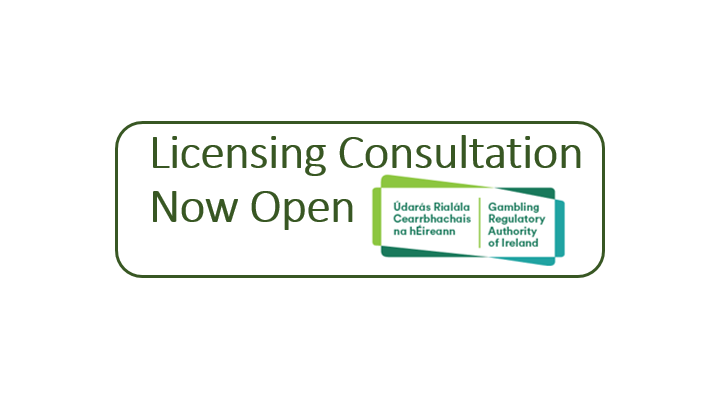
The GRAI would like to hear the views of stakeholders, including operators and the public on the proposed regulations concerning licensing which will be commenced on a phased basis. Consultation Published: Monday 7th April 2025Submission period closes: 5pm on 5th May 2025About usWe are the Gambling Regulatory Authority of Ireland. We were established on 5 March 2025. Our role is to regulate gambling activities in Ireland.The law that established us, and sets out what we do, is the Gambling Regulation Act 2024. Those who wish to provide gambling activities in Ireland will need a licence from us. We can issue different types of gambling licences for in person or remote gambling activities, including the following:1. Business to consumer gambling licencesThis type of licence applies to those providing betting, gaming or lottery activities to consumers. 2. Business to business gambling licencesThis type of licence applies to those selling or supplying a gambling product or gambling related service.3. Licences for a charitable and philanthropic purposeThis type of licence applies to those who wish to provide betting, gaming, or lottery activities for charitable and philanthropic purposes.We intend to start our licensing function in a phased way, with different licence category types opening at different times.Our current plan is to first open for Business to Consumer betting licence applications in December 2025 (both in person and remote). This will be followed by opening for gaming licence applications (remote only) towards the end of the first quarter of 2026. However, the order and timing of commencement maybe subject to change. The license application process will take a number of months. Once an application is submitted it will be reviewed to ensure all necessary information and documentation has been submitted. We will then undertake various checks on the applicant and on the Information and documentation submitted to verify the information and to ensure it is given due consideration when making the decision to grant or refuse the license application. What is the purpose of this consultation?We have the power to make regulations. Regulations are laws created by Ministers or public bodies under powers given to them by Acts of the Oireachtas. The first set of regulations we plan to make will: a. Set the application fee for applications for betting (in person and remote) and gaming (in person and remote) licences. This is provided for in section 38 of the 2024 Act.The second set of regulations we plan to make will:b. Set the duration for which a gambling licence remains in force. This is provided for under section 108 of the 2024 Act.AND c. Set out some additional conditions which will apply to gambling licences. This is provided for under section 129 of the 2024 Act.We would like to hear the views of stakeholders, including operators and the public on the proposed regulations. For more information including how to submit a response please visit: Please Note this Consultation has now closed
07 Apr 25
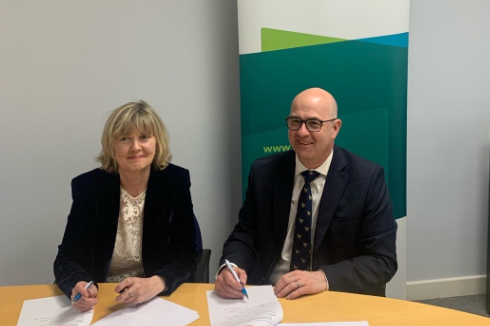
Dublin, 3rd April 2025. The Gambling Regulatory Authority of Ireland was delighted to host the CEO of the UK Gambling Commission in Dublin on the 2nd April 2025. During the visit both CEOs formally signed a Memorandum of Understanding (MOU) between the Gambling Regulatory Authority of Ireland (GRAI) and the UK Gambling Commission.This agreement establishes a framework for cooperation and sets out the broad principles of collaboration between the Gambling Regulator and the UK Gambling Commission. The shared aims of both regulators are to enable closer working relationships which will enhance each organisation's ability to discharge their respective duties and functions. As well as signing the document, there was a constructive bilateral meeting which discussed areas such as compliance, monitoring and enforcement, alongside other regulatory matters relevant to both jurisdictions. This is the first of a series of MOUs which the GRAI intends to put in place with other Gambling Regulators across the EU in the months ahead. On welcoming the agreement, CEO of the Gambling Regulatory Authority of Ireland, Anne Marie Caulfield said: ‘This Memorandum of Understand with the UK Gambling Commission is an important step in formalising the working relationship between the two regulators and I would like to thank Andrew Rhodes, and a number of his colleagues across the various areas of the Commission for their advice and support over the past number of months. Ireland and the UK share many of the same operators and gambling practices, so putting this agreement in place will enhance our ability to share information and discharge our respective regulatory responsibilities effectively. Open dialogue and close cooperation between both jurisdictions is paramount and I greatly look forward to continuing this close cooperation’s for the years to come.’
03 Apr 25
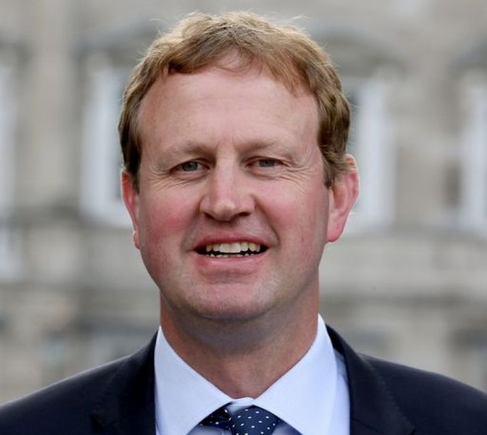
4 March 2025 - Press Release, Department of Justice The Minister for Justice, Mr Jim O'Callaghan T.D. has today (Tuesday) signed the order to commence parts of the Gambling Regulation Act 2024 to enable the Authority to become operational and the order to establish Údarás Rialála Cearrbhachais na hÉireann, the Gambling Regulatory Authority of Ireland, on a statutory basis. Minister O’Callaghan has also approved the appointment of the seven members of this new, independent Authority, who will be appointed and commence their roles with effect from tomorrow, 5 March, 2025. They will be the members of the Authority which is responsible for regulating and licencing all gambling providers in the State and which has wide ranging powers to regulate both in-person and online gambling, gaming and most lotteries. Mr. Paul Quinn has been appointed as chair of the Authority and the other newly appointed members are as follows:Ms. Celine CraigMs. Marion KellyMs. Rita PurcellMr. David HicksonMr. Michael McGrathDr. Colin O’Driscoll, Ordinary Member Minister O’Callaghan said:“Today marks a new era for the regulation of gambling in the Irish State.“The establishment of the Gambling Regulatory Authority of Ireland is a further step towards replacing Ireland’s outdated gambling laws with a streamlined and simplified licensing framework, which will reflect the nature of modern gambling and take into account the harms associated with problem gambling, providing safeguards to protect people from those harms, especially children.“It is designed to meet the challenges of gambling responsibly in 21st century Ireland, providing clarity for operators and for consumers and taking a responsible approach to balancing the freedom to gamble with the safeguards to protect people from falling prey to addiction.“I want to take this opportunity to acknowledge the hard work of my predecessor, Minister Helen McEntee and Minister James Browne, in the development of this legislation.” Minister O’Callaghan added:“I warmly congratulate Mr. Paul Quinn on his appointment as Chair of the new Authority and each of the newly appointed Authority members and wish them well in their new roles.“The newly appointed members will now join CEO Anne-Marie Caulfield and her staff in commencing the Authority’s operations and legislative powers, on a phased basis. I understand that this includes, as a priority, work on progressing the licensing process, with a view to inviting applications for some licence types within the coming year.” In accordance with the provisions of section 17 of the 2024 Act, appointments to the Authority will be for an initial period of three or four years. All members of the Authority may be reappointed for a second four-year term. Speaking this morning, Minister Browne stated:“Minister O’Callaghan’s actions today mark the culmination of much hard work and dedication by Minister McEntee, Ms. Caulfield, Minister O’Callaghan and myself, supported by a core team of Authority staff and Departmental officials.“I am pleased and encouraged at this Government’s commitment to continuing the phased commencement of the Authority’s operations and legislative powers as a priority.” Minister for Health, Jennifer Carroll MacNeill, T.D., commented:“I welcome today’s development as an important step towards ensuring that the harms associated with gambling are minimised. I look forward to the Department of Health working with the Gambling Regulatory Authority on initiatives to promote and progress this important goal.” Welcoming the establishment of the Authority and the appointment of its members, the CEO of the GRAI Anne-Marie Caulfield said:“‘I greatly welcome the appointment of the seven-member Authority and the establishment of Údarás Rialála Cearrbhachais na hÉireann. I would like to thank the Ministers, Oireachtas members, the Office of the Parliamentary Counsel and Department of Justice officials for their work in bringing about our establishment.“I look forward to fulfilling our mandate and delivering a safe, well-regulated and transparent sector, with consumer protection at its core.”Gambling Regulatory Authority of Ireland established effective from 5 March 2025Seven members to be appointed to independent authority, including chair Mr Paul Quinn
04 Mar 25